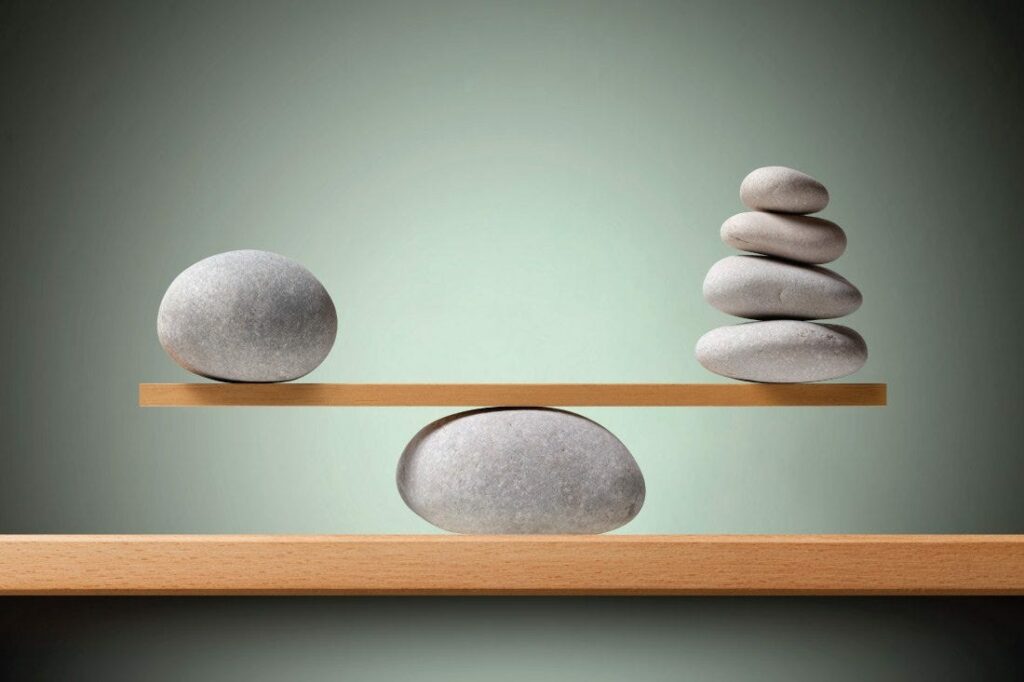
We’ve all heard the age-old advice, “You should choose quality over quantity.” It states that value is more important than volume. In our culture of excess, this can be challenging advice to follow. In our quest for perfection, we risk focusing too much on the chase for more – more money, status, material objects, and followers. But more isn’t always better; we can be happier with less when we prioritize quality over quantity. Consider these six reasons why you should choose quality the next time you face many options. (Estimated reading time: 10 minutes)
Be a yardstick of quality. Some people aren’t used to an environment where excellence is expected.
– Steve Jobs
Over the past two centuries, there has been a tremendous improvement in global living conditions. With the rise of technology, healthcare, capitalism, and human rights laws, most people have improved living standards. Yet, human progress has come at a cost.
Most of us buy too much stuff. We eat too much. We spend too much time on social media. In our maddening quest for perfection, we have become a culture of excess. We risk plunging down a rabbit hole of ‘never-enoughness’ as we chase money, status, material objects, and followers.
At some point, people who live a life of excess must ask themselves what is at the root of their desire for more, and why they are never satisfied. The Buddhist term for people whose appetites exceed their needs is ‘hungry ghosts.’ Buddhist imagery depicts them as creatures with huge, empty bellies, thin, long necks, and tiny mouths.
These creatures are always on the prowl for food and drink, but their small mouths and skinny necks make it almost impossible for them to receive the nourishment to satisfy their appetites.
A person who mirrors the ways of a “hungry ghost” will overindulge in various things like drugs, drinking, smoking, gambling, lust, shopping, or anything else that they think will feed the void within.
Sooner or later, the hungry-ghost-like people realize they are chasing an illusory form of fulfillment. They recognize that more isn’t always better, and they can actually be happier with less.
Being proactive about our happiness and wellbeing isn’t about hoarding more things we think will make us happy. It’s about being discerning when it comes to what we spend our time, hearts, and energies on.
When we step off the treadmill of excess and sift through the opportunities we have, we’re overloaded with an awareness of who we are and what we value. By doing this, we choose quality over quantity because we want to feed our souls, not our egos.
Quality vs. quantity: what they are and how they differ

We’ve all heard the age-old advice, “You should choose quality over quantity.” It’s a phrase we encounter in all aspects of life. And while it’s a virtuous motto to live by, it’s not always clear what it means and how it applies across different contexts.
In essence, quality over quantity is a theory of measurement used to explain why we should invest in quality things, people, experiences, products, and services. It states that value is more important than volume. Prioritizing quality will benefit us in the long run because it offers more value, significance, and longevity.
Let’s take a closer look into what each term means:
Quality: The quality of something refers to its degree of perfection and excellence based on its description, how it was made, and how it compares to other items in the same category. It can relate to tangible items that you can hold, or intangible things like services. High-quality items stand out and are perceived as special and valuable.
An example of quality might be clothes made with premium materials requiring an intricate production process, or a high-value woman who knows her self-worth, prioritizes self-care, engages her time in meaningful pursuits and treats people, regardless of their background, with kindness.
Quantity: The quantity of objects is about how many or how much there is — the size, extent, or sum of something. It’s countable, measurable, and is usually expressed in numbers. Measuring quantity indicates the efficiency and effectiveness of a particular strategy.
For example, a higher quantity in sales is good because it results in more profit and proves that a business has a robust revenue generation model. More traffic to a website can boost the visibility of online products and services and increase brand awareness and reach. A camera or a TV with an 8K resolution is the highest you can find because it exceeds other products in the market.
The difference between quality vs. quantity
The main difference between quality and quantity is that quality is subjective and conditional, which means that the value of an item varies based on a person’s preferences, priorities, feelings, and biases.
Quantity, on the other hand, is a fact that cannot be influenced by opinion or perspective. As the saying goes, “numbers don’t lie,” they can only change when there is a change in the number. For instance, if an athlete has received two gold medals and wants to have two more, they must win two more games. Having the desire to win is not enough to achieve their end goal.
Another difference is that quality focuses on a specific feature or characteristic of something. In contrast, quantity is the numerical value of something, such as size, number, or number of items, people, resources, and experiences.
Knowing the difference between quality and quantity can help us decide which metrics are best suited to understanding the value and effectiveness of our choices and actions, and how to achieve the best outcomes that will result in deeper fulfillment and meet our needs and values.
Why choosing quality over quantity matters

Knowing when to choose quality over quantity matters now more than ever. In a world where we’re presented with instant gratification and quick fixes at every step, it’s easy to compromise on quality. We’re told that more is better, and the faster we get more of what we want, the quicker we’ll ascend to the top of the social hierarchy.
In our consumer-driven culture, we measure a person’s success based on their net worth, possessions, the size of their network, and the number of fun experiences they have. While there’s nothing wrong with having more in all these aspects of life, their actual value for the owner is based on how much satisfaction and meaning it has to them.
For example, despite being worth $125 billion, Warren Buffet lives in the same house he bought in 1958. Instead of living in a multi-million-dollar mansion, he lives in a home worth $285,000 in 2020 dollars. Buffet has no intention of putting his house for sale, saying, “I wouldn’t trade it for anything.”
People like Buffet know that having bigger and better does not necessarily satiate a desire that emanates from the deeper aspects of our being. You’ll profit in many ways from most of your life choices when you resist the temptation to prioritize quantity and shortchange on quality.
What if you chose to buy fewer but nicer things? Living an intentional life is about selecting things that add value to your life and knowing that quality should always be a deciding factor.
There is a purpose behind choosing quality over quantity because it moves you closer to the person you want to become and the life you want to lead. For that to happen, you seldom need more but just enough of the right thing.
Here are examples of choosing quality over quantity:
- Having a few good friends who are trustworthy, loyal, and who add to your life instead of superficial relationships with people who only reach out when they need you.
- Publishing a couple of high-quality social media posts that were well-thought-out instead of a barrage of posts that aren’t aligned with your brand or message and, therefore, aren’t helpful to your followers.
- Investing in a good quality car that will last longer and require less maintenance than a severe fixer-upper with a short life span.
- Buying fresh, nutritious food that keeps your body healthy and gives you energy and vitality instead of processed and junk food that has the opposite effect on your body.
6 reasons why you should choose quality over quantity
If you feel like you’re swayed too much by quantity and accumulate too much stuff that brings you little to no satisfaction, consider these six reasons the next time you find yourself faced with the choice between quality over quantity.
1.Quality simplifies your life
Living a simpler life can lead to fulfillment. A minimalist approach means focusing on what’s truly important to you. When you have fewer things, it takes up less space, creates less clutter, and you have less to worry about.
The average person makes around 35,000 decisions a day, and cutting that down can free the mind and lead to less fatigue. That’s why many people in leadership positions try to reduce their decision load. For example, former U.S. president Barack Obama only wore blue and gray shirts during his presidency, giving him one less decision to make.
2. Quality can save you money in the long-term
There’s no doubt that quality items cost more. While the initial expenses are higher, it’s a better use of your money because you can avoid shelling out the maintenance expenses you would need to spend later. Lower-priced items often require the most energy, money, and time to maintain and tend to wear out quicker.
You often end up spending more if you buy cheap products or services. Being frugal is not only considering the initial high cost of goods but also how long the item will serve you compared to items at lower price points.
3. Quality supports sustainability and the environment
Given the current state of the environment, we need to think about our consumer behaviors and how they affect the planet. When you buy high-quality items and take good care of them, they last longer, require fewer replacements, and produce less waste.
Buying lower-quality items becomes an environmental burden because they break down, become waste, and increase landfills. By investing a little extra money in quality eco-friendly products and services that are ethically sourced, you are doing your part to care for our planet.
4. Quality is more memorable

Quality things result in lasting memories. We’re more likely to cherish the memories connected with things and experiences that left a lasting impression on us, like a delicious piece of cake made by your grandma or a fun vacation with people you love and enjoy spending time with.
When you choose something everyone else does, like mass-produced products, you won’t think much about it or feel the need to care for it. But if you buy a unique quality piece like a handmade cuckoo clock from your trip to Germany, you’ll be more likely to take care of it because of its uniqueness and the memories attached.
It’s not easy to remember every piece of clothing you’ve purchased or everyone you’ve met, but you will remember the ones that stood out to you and where you invested more of your time, heart, and energy.
5. Quality makes the best of limited resources
Time, energy, and money are limited. That’s why we need to be wise about using these precious resources. If you’re constantly trying to keep up with the newest trends, buying the latest thing, or spending time with too many acquaintances to appear popular, you’re wasting resources that could have been spent doing things and being with people you love.
When you choose quality over quantity, you allocate your resources more wisely and get the best value from them. You also think about the long-term instead of giving in to instant gratification. Instead of spreading yourself too thin, try honing in on the people and experiences that fill your heart with joy.
6. Quality leads to a life of happiness
Less stuff reduces stress and anxiety, eliminates distractions, and gives more time and space to reflect and rest. Having fewer demands on your attention, time, and energy makes it easier to seek happiness and remain joyful and peaceful.
This can be challenging when we’re bombarded with ads telling us to buy and that having more is the key to happiness. But the truth is that more things won’t make you happy; it can be a burden. Choosing quality over quantity will fulfill you on the deepest level because it speaks directly to your likes, unlike a mass-produced placebo for bliss.
Having a delicious, filling, nutrient-dense salad makes you feel satiated. It promotes inner balance instead of gorging on calorie-rich foods at an all-you-can-eat buffet that makes you feel unstable and maybe a little guilty.
In his 2005 commencement address at Stanford University, Steve Jobs reminded graduates that their time was limited and that they shouldn’t waste it living someone else’s life. Jobs was essentially asking them to think for themselves and listen to their hearts and intuitions as “they somehow already know what you truly want to become.”
Following this advice will help us make mindful decisions and experience a higher quality of life that fulfills us on the deepest level and benefits everyone around us in the long run.
All my best on your journey,
Seline

Questions for you: Do you remember a time when you chose quality over quantity? What was the outcome of your decision, and were you happy with it?
Did you like this post? Sign up below, and I’ll send you more awesome posts like this every week.

Have Your Say